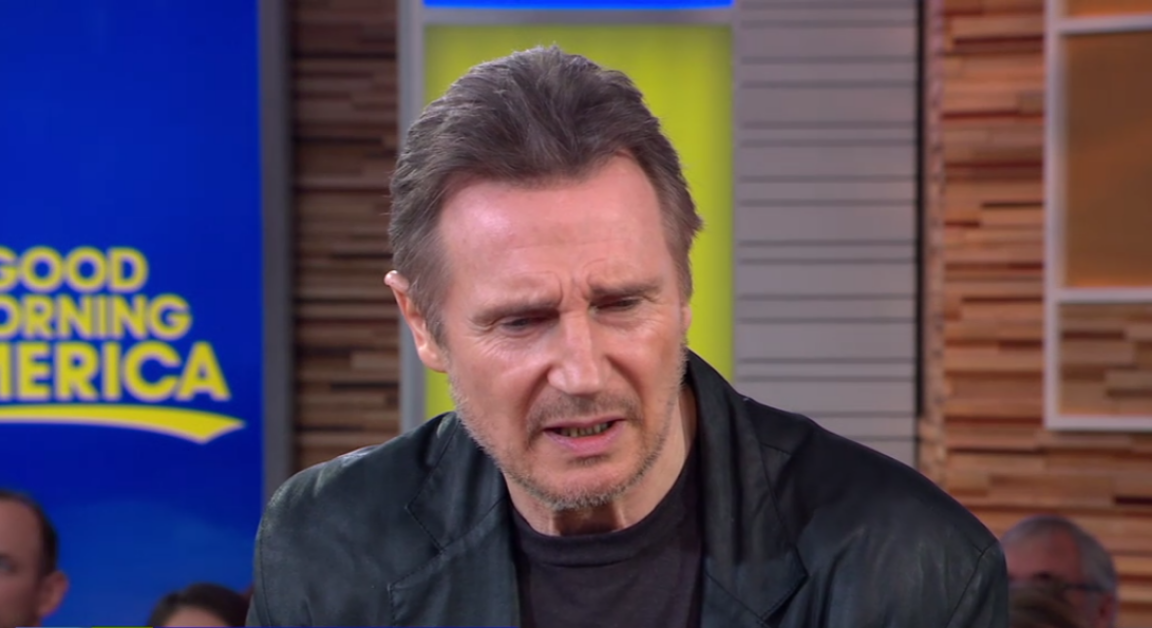Actor Liam Neeson appeared on Good Morning America to discuss his new film Cold Pursuit and also to talk about an interview that appeared in The Independent Monday in which he talked about hunting for a “Black bastard” to kill in his younger years.
In the interview, the actor recalled an incident in which a Black man reportedly raped someone close to him. After finding this out, Neeson said he’d go out at night with a cudgel “hoping some Black bastard would come out of a pub and have a go at me or something … so I could kill him.”
The actor made it clear he wasn’t hunting down the rapist but would have settled for any Black man.
As Blavity reported, the interview drew swift condemnation online with many calling Neeson a racist.
Tuesday, the Irish action star took to the GMA stage to refute the label, telling host Robin Roberts plainly: “I am not a racist.”
He also told Roberts he felt something snap inside him while listening to his friend’s account, saying, “I’d never felt this feeling before, which was a primal urge to lash out.”
From there, Neeson said he decided to act on that feeling.
"There were some nights I went out deliberately into Black areas in the city looking to be set upon so that I could unleash physical violence," Neeson said. "And I did it for, I'd say, maybe four or five times until I caught myself on, and it really shocked me, this primal urge I had. It shocked me, and it hurt me. I did seek help."
That help came in the form of a Catholic priest to whom the actor confessed, as well as friends.
Although the actor said it doesn’t excuse his reaction, Neeson said he thinks he went out looking for random revenge because he was raised during the Troubles, an armed conflict in Northern Ireland between (mostly Catholic people) who wanted Ireland to become its own country and (mostly Protestant people) who wished for Ireland to stay in the U.K.
According to a separate report from The Independent, nearly 4,000 people were killed in the decades-long conflict; more than 2,000 of that number were civilians.
Much of the fighting was guerrilla warfare, and Neeson said the struggle devolved in a kind of tit-for-tat series of attacks that profoundly shaped how he thought about justice.
“One Catholic would be killed, the next day one Protestant would be killed,” Neeson said. “One Catholic pub would be bombed, a Protestant pub would be bombed. I grew up surrounded by that.”
Roberts asked the actor why he didn’t ask for more details about his friend’s attacker, like his height and weight.
“I asked all those questions, I did,” Neeson said. “But I asked about race.”
Still, the actor maintained he would have gone hunting for a white man had his friend said the attacker was white.
“If she’d said an Irish, or a Scot, or a Brit or a Lithuanian, I know it would have had the same effect,” Neeson said. “I was trying to show honor, to stand up for my dear friend in this terrible, medieval fashion.”
Roberts also asked Neeson what he felt everyone ought to learn from this, and he said, “Talk, open up, talk about these things. We all pretend we're kind of politically correct. I mean, in this country, it's the same in my own country too, you sometimes just scratch the surface and you discover this racism and bigotry, and it's there.”
The actor then asked Roberts what she thought he, and everyone watching, ought to take away.
“We need to get to the root of it,” the host said. “You’re admitting that it’s wrong, but you also have to understand the pain of a Black person hearing what you said.”
“You’re absolutely right,” Neeson said. “And at the time … I didn’t think about that.”
You can watch the full interview below:
Blavitize your inbox! Join our daily newsletter for fresh stories and breaking news.
Now, check this out:
Liam Neeson Makes Disturbing Admission That He Once Sought To Kill A Black Man Out Of Vengeance
Jussie Smollett Speaks For The First Time Following Racist And Homophobic Attack
